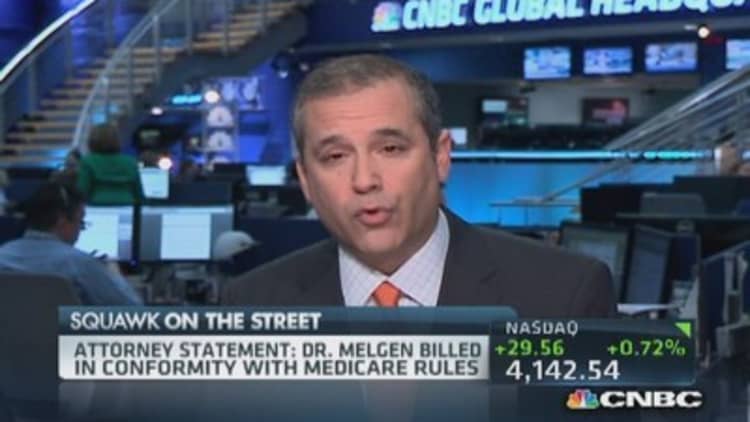Dr. Michael McGinnis, a pathologist from New Jersey, had just returned home Wednesday after being out of town on business when his phone exploded with virtually nonstop calls from reporters.
"You name it: USA Today, Bloomberg, NBC," McGinnis told CNBC.com. "My head's spinning."
His abrupt, unexpected popularity with the media stemmed from McGinnis' prominent placement on a list of 880,000 doctors and other medical providers who had received $77 billion in reimbursements from the government-run Medicare program in 2012.
McGinnis was third on that list, with $12.6 million in reimbursements, according to data released Wednesday by the federal government, the first such disclosure of Medicare payments to individual providers in 35 years.
"I was actually stunned," McGinnis said of being told that amount was attributed to him.
But while McGinnis said, "I'm sure the numbers are correct," he added that it is not correct to assume that he received even close to all of that money.
Read MoreReal Medicare waste? Uncle Sam stayed mum too long
"Several ex-wives ... they'd be ecstatic if I was making that kind of money," he said. "I know I would."
Instead, McGinnis said, that amount was billed not only by him, but also by nearly 30 pathologists who work at the three practices he runs in New Jersey. One of them is PLUS Diagnostics, based in the city of Union, which he said is "the largest independent anatomic pathology lab in the country."
McGinnis was identified as the person being reimbursed all that money because 28 pathologists were "using my NPI number," he said. The NPI number is the National Provider Identifier, a 10-digit number that physicians must use to be reimbursed by Medicare, the health insurance program for people age 65 and older.
McGinnis' story was one example, albeit a major one, of how the massive amount of data released Wednesday by the Centers for Medicare and Medicaid Services will have to be carefully used by researchers and reporters because of the presence of errors, or ambiguities in it.
Many of the initial stories about the data focused on doctors who had been reimbursed the highest amounts, including one in Florida who with nearly $21 million in reimbursements, was in first place.
Read More$21 million to 1 doctor? Medicare payouts revealed
McGinnis said, "As far as I'm concerned, any and all data should be available for all people to see," and added that in the case of his practices, all billings to Medicare were done appropriately.
But, McGinnis added, "Somebody is sitting in a cornfield in Nebraska and thinking that one doctor is making this kind of money."
Although he wasn't mentioned by name during a conference call that CMS officials had Wednesday with reporters, the practice of doctors or nurses or other providers using another physician's NPI number for Medicare billings was discussed as a reason that some individual doctors may have been identified as being reimbursed at higher rates than they truly were.
"We believe, in general, providers should not be using other providers number to bill," said Niall Brennan, acting director of the CMS Offices of Enterprise Management. "We'd like to encourage providers to use their own NPI number."

But he and CMS Principal Deputy Administrator Jonathan Blum, in response to a follow-up question, conceded that in some states, physician assistants and others who administer treatment under the technical authority of a doctor are required to use that physician's NPI number in billing Medicare.
However, they also said that the data released Wednesday indicate that the practice of using someone else's NPI number occurs at a higher rate than can be explained by the rules of some states.
Read MoreHere's what really fueled the Obamacare surge
Lawrence Vernaglia, a health-care lawyer at the firm Foley & Lardner, said he was worried that the raw data release by CMS could be misconstrued by the general public.
For example, Vernaglia said, "Just because somebody got paid a lot doesn't mean they took home a lot."
But some patients may look at the data online "and think their doctor makes too much money," he said
The American Medical Association, which in 1979 had obtained a federal injunction that remained in effect for nearly 35 years that prevented Medicare reimbursement data from being disclosed, raised similar concerns about the accuracy and usefulness of the data to the public.
"We believe that the broad data dump [Wednesday] by CMS has significant short-comings regarding the accuracy and value of the medical services rendered by physicians. Releasing the data without context will likely lead to inaccuracies, misinterpretations, false conclusions and other unintended consequences," the AMA said in a statement.
"Thoughtful observers concluded long ago that payments or costs were not the only metric to evaluate medical care. Quality, value and outcomes are critical yardsticks for patients. The information released by CMS, will not allow patients or payers to draw meaningful conclusions about the value or quality of care."
"The AMA is disappointed that CMS did not include reasonable safeguards that would help the public understand the limitations of this data."
But Brennan and Blum, in their remarks to the media Wednesday, said having the data become public was not only the right thing to do because Medicare is paid for with taxpayer money, but also because having researchers and reporters review the data could lead to exposure of fraudulent billing and of variations in treatment between geographical regions that might warrant changes in policy.
"For too long, this information was not made public, it was protected, which raised many questions of what the program was spending, how it was spending," Blum said. "We want the press and outside researchers to mine this data to find outliers, to identify spending that does not appear to be in the beneficiaries interest and the taxpayers' interest."
McGinnis, the New Jersey pathologist, said, "I don't have any fear of data as long as it's correct."
—By CNBC's Dan Mangan


